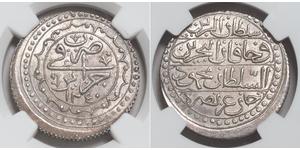(Venduta per $99.0)
1802, Netherlands, Batavian Republic. Silver Rijksdaalder (2½ Gulden) Coin. aXF-
Mint Year: 1802 State: Batavian Republic Reference: KM-10.4 ($250 in XF!). Mint Place: Utrecht (privy mark: shield) Denomination: Rijksdaalder (2½ Gulden) Condition: Smoothed/tooled edge (the coin was probably once set in a frame), cleaned, minor greenish deposits, otherwise about XF! Material: Silver (.868) Weight: 27.56gm Diameter: 41mm
Obverse: Armored knight standing right, holding shield with cot-of-arms on a band and shouldering sword. Legend: MO : NO : ARG : PRO : CONFOE : BELG : TRAI . Expanded: "CONCORDIA RES PARvae CREScunt TRAjec.." Translated: "Through concord little things grow (Union is strength), Utrecht" Reverse: Crowned shield of the Netherlands (crowned lion holding sword and thunderbolts), splitting date (18-02). Legend: CONCORDIA . RES . PARVAE . CRESCUNT . (privy mark: shield) Translated: "Through unity little things grow (Union is strength)!"
The Batavian Republic (Dutch: Bataafse Republiek) was the successor of the Republic of the United Netherlands. It was proclaimed on January 19, 1795 and ended on June 5, 1806 with the accession of Louis Bonaparte to the throne of the Kingdom of Holland.
The new Republic enjoyed widespread support from the Dutch population and was the product of a genuine popular revolution. Nevertheless, it clearly was founded with the armed support of the revolutionary French Republic. The Batavian Republic became a client state of first that "sister-republic," and later of the French Empire of Napoleon Bonaparte, and its politics was deeply influenced by the French who supported no less than three coups d'état to bring the different political factions to power that France favored at different moments in her own historical development. Nevertheless, the process of creating a written Dutch constitution was mainly driven by internal political factors, not by French influence. That is, until Napoleon forced the Dutch government to accept his brother as monarch.
The political, economic and social reforms that were brought about during the relatively short duration of the Batavian Republic have had a lasting impact. The confederal structure of the old Dutch Republic was permanently replaced by a unitary state. For the first time in Dutch history, the constitution that was adopted in 1798 had a genuinely democratic character (despite the fact that it was pushed through after a coup d'état). For a while the Republic was governed democratically, though the coup d'état of 1801 put an authoritarian regime in power, after another change in constitution. Nevertheless, the memory of this brief experiment with democracy helped smooth the transition to a democratic government in 1848. A type of ministerial government was introduced for the first time in Dutch history and many of the current government departments date their history back to this period.
Though the Batavian Republic was a client state, its successive governments tried their best to maintain a modicum of independence and to serve Dutch interests even where those clashed with those of their French overseers. This perceived obduracy led to the eventual demise of the Republic when the short-lived experiment with the (again authoritarian) regime of "Grand Pensionary" Schimmelpenninck produced insufficient docility in the eyes of Napoleon. The new king, Louis Napoleon, surprisingly did not slavishly follow French dictates either.
Only 1$ shipping for each additional item purchased!
2 Ban Romanian Principalities (1859-1881) Rame
il gruppo ha 4 monete / 3 prezzi
⇑
1 Budju Algeria Argento Mahmud II
il gruppo ha 4 monete / 3 prezzi
⇑







-300-150-DRaBwfuWkloAAAGLv51rgHlM.jpg)








